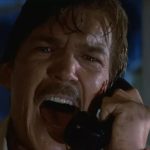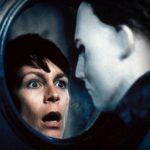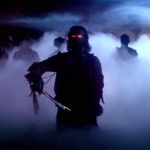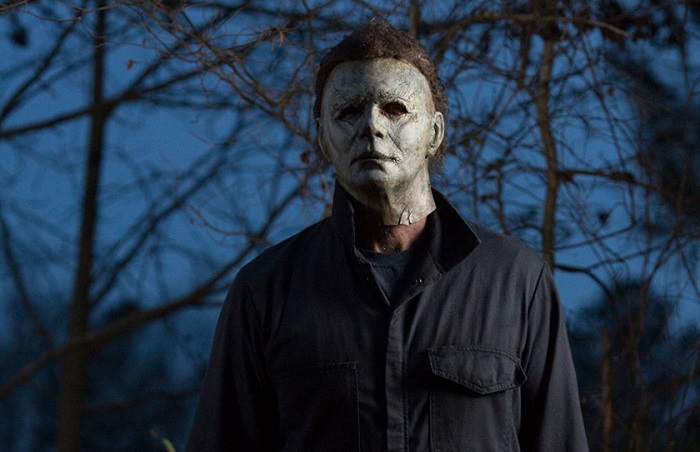
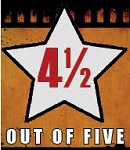
The Halloween franchise has had a rough go of it for a long time. John Carpenter and Debra Hill, the filmmaking team behind the first three films, both bolted after audiences rejected their attempt to turn it into an anthology series with Halloween III: Season of the Witch back in 1982, and what followed was a string of increasingly limp sequels, semi-reboots and full-on remakes, none of which were ever able to come close to matching what Carpenter was able to pull off way back in 1978 with a tiny budget and a spray-painted Captain Kirk mask. Still, the original is rightfully considered a seminal horror classic, and the fire that burns within its fan base has never died out.
Turns out two of those fans are director David Gordon Green (he of many small indie dramas and larger comedies like Pineapple Express) and his friend and frequent collaborator, comic actor Danny McBride. Those aren't the guys you'd expect to be able to extract the best elements from the 1978 film and successfully infuse them into a brand new sequel. But here they are in 2018, bringing to theaters their own Halloween movie that, while not groundbreaking like the original, throbs with the same relentless intensity. Simply (and maybe confusingly) titled Halloween — the third time that title has been used in this franchise! — this new sequel is again another sort of reboot, one that picks up after the first film and ignores all other sequels in the franchise. The script, by Green, McBride and Jeff Fradley (and with input from Carpenter, finally back on board as an executive producer and composer), offers up an alternate Halloween timeline where Michael was never Laurie Strode's brother and has spent the last 40 years locked away in a psychiatric hospital. (At one point in the film, some characters are playing a Back to the Future II pinball machine, and I swear this a sly joke about how we're now in a completely different timeline than what we've seen in nine other movies.)
Cutting bait on the franchise's convoluted and increasingly stupid continuity is a smart move, as it allows Green, who directed, to return to the brutal basics. Laurie is back, still played by the great Jamie Lee Curtis, but this isn't the Laurie we saw in 1998's Scream knockoff Halloween H20: 20 Years Later. (God, what a terrible title that was. Maybe it's for the best we just call them all Halloween now.) This Laurie never recovered psychologically from Michael's assault on her and her friends 40 years ago. She has a daughter (Judy Greer) and a granddaughter (Andi Matichak) from which she's largely estranged, as she's spent the last four decades living out in the woods in a heavily fortified cabin, hoarding weapons and shooting target dummies. She's clearly not well, and even returning to the town of Haddonfield to attend a small celebratory dinner for her granddaughter ends with her in tears, still terrified by the knowledge that Michael lives and struggling with a horrific event that feels unresolved.
Meanwhile, two journalists who produce a Serial-esque podcast pay Michael a visit in a riveting opening sequence that finds the embodiment of pure evil standing silent and motionless in a courtyard full of the the mentally insane. When one of the podcasters pulls out the mask Michael wore the night of the murders, the other patients begin to freak out, their already fragile minds breaking under the pressure of some exposed evil. But Michael just stands there unmoving, as Green gives us hints of his current face (late-middle-aged and bearded, with at least one bad eye) without eliminating the mystique. Halloween the franchise has always struggled with the notion of whether Michael is a supernatural force of nature or just a serial killer in an unsettling mask, and, as this scene demonstrates, Gordon is able to successfully toe that line for the entire film without completely succumbing to one side or the other. Yeah, Michael is just a human being here … but there remains something about him that's unexplainable, some darkness around his edges that does seem inhumanly primal. And those other patients could feel it.
In the movie's only eye-rolling coincidence, Michael is set to be transferred to a facility that's more dungeon than hospital in the days right before Halloween. He escapes (as horror-movie villains are wont to do), tracks down the podcasters to retrieve his iconic mask and then makes a beeline toward downtown Haddonfield where he can continue what he started all those years ago. (I almost typed "finish what he started," but I don't think there's any "finishing" with Michael. He's a machine. He kills until he's stopped. That's it.) The first act is all solid set-up stuff. Curtis's strong performance makes Laurie feel hardened yet sympathetic. Her granddaughter's teenaged classmates — also known as kitchen-knife fodder — are comparable to Laurie's friends from the original film. They're not exactly full characters, but they feel real enough that their eventual deaths matter.
There's one high-school girl in particular who's allowed to have a charming little relationship with the boy she babysits. (In fact, that boy, who's probably around nine, gets some of the best lines in the movie and pretty much runs away with the scenes he's in. There's very little humor in this movie, but he's hilarious.) The film also uses these scenes to make coy meta-observations about the original film. One character shrugs off the events of Carpenter's movie, remarking that the deaths of four people 40 years ago really isn't as big a deal as some people make it. That line works two ways, both as a reminder that Halloween '78 is quite mild compared to the endless gorefests that followed in its wake and as a nod to just how much scarier the world seems in general today. The white suburban anxieties Carpenter's film trafficked in seem downright quaint compared to today's charged political climate.
Once Michael arrives in town, the new Halloween turns into a masterclass of slasher filmmaking. Who knew Green had it in him? Two sequences stand out: One in which the camera tracks a teen boy and girl through different parts of a house and we're not sure which one Michael is stalking, and another set in a backyard lit by the harsh blaze of some motion-activated floodlights … until suddenly it's not. Both are scary as hell, and I can only imagine Carpenter cackling with glee as Green and McBride showed him the edited-together footage. This is a merciless and unforgiving movie, one that firmly re-establishes Michael as the most terrifying of the horror-film icons.
Eventually, Michael crosses paths with Laurie, and the movie turns into a horror rematch for the ages. Laurie can't forgive herself for the neuroses she inflicted on her daughter, but she damn well will be ready to protect her when evil comes calling. The fight does not disappoint, with Green staging several beats that both recall and twist events from the original film. This Halloween almost has a The Force Awakens-like quality where it takes some of the most memorable imagery and moments from the original film and repackages them in delightful ways. (You know that feeling when the camera swooshes over to reveal the Millennium Falcon as Rey and Finn try to escape Jakku? I know it's a weird comparison to make, but there are things in this movie that give off that same vibe. Green plants callbacks throughout his film but finds little ways to make them feel clever instead of desperate.) There's also a female-empowerment component to the movie, with three generations of women viciously fighting back against the man who, in some part, defined all of their lives for the worse. As sadly tends to be the norm, Greer is mostly underused here, though she gets a great line in the film's climax.
Oh, speaking of things that are great … you didn't think I was going to not talk about the score, did you? IT'S FUCKING FANTASTIC. Carpenter returned to music a few years ago, touring live and putting out new synth music under the "Lost Themes" title. But to hear a full, legitimate John Carpenter score (composed with his son, Cody Carpenter, and Daniel Davies), played throughout a legitimately great Halloween sequel, is a film-nerd's dream come true. The variations of the classic Halloween theme that the trio came up with do not disappoint. The soundtrack is five stars, 10 out of 10, no counterpoints will be entertained.
I saved the one real criticism I have for the end of this review because the misstep comes at the very end of the movie. Without spoiling anything, I wish Green would have taken another pass on the film's final 60 or so seconds. Halloween ends very abruptly — too abruptly — and it settles on a freeze-frame that I found to be corny and suspect could be widely misinterpreted. (In fact, it elicited a few groans at my screening, which weren't entirely unjustified.) It feels like the filmmakers weren't sure where and how to cut to credits — and were maaaaaybe pressured to leave things just a little bit open for a possible sequel — and it ends up robbing the film of a potentially more powerful ending. It's a legit issue, though a minor one. And, in the grand scheme of Halloween-sequel mishaps, a botched final minute ranks at about number 648 on a very long list. It's certainly doesn't negate the 100-plus minutes of precision terror that preceded it. This is a fantastic horror film, one of the best slasher sequels ever made, and the first Halloween movie in ages to do John Carpenter and his original vision proud.

